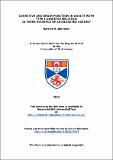Cognitive and brain function in adults with Type 1 diabetes mellitus : is there evidence of accelerated ageing?
Abstract
The physical complications of Type 1 diabetes mellitus (T1DM) have been understood as an accelerated ageing process (Morley, 2008). Do people with T1DM also experience accelerated cognitive and brain ageing? Using findings from research of the normal cognitive and brain ageing process and conceptualized in theories of the functional brain changes in cognitive ageing, a combination of cognitive testing and functional magnetic resonance imaging (fMRI) techniques were used to evaluate evidence of accelerated cognitive and brain ageing in middle-aged adults with T1DM.
The first part of this thesis comprises a cognitive study of 94 adults (≥ 45 years of age) with long duration (≥ 10 years) of T1DM. Participants completed cognitive assessment and questionnaires on general mood and feelings about living with diabetes. Findings highlighted the importance of microvascular disease (specifically retinopathy) as an independent predictor of cognitive function. The incidence and predictors of mild cognitive impairment (MCI) were then explored. Results indicate a higher percentage of the group met criteria for MCI than expected based on incidence rates in the general population, providing initial evidence of accelerated cognitive ageing. Psychological factors were explored next. The relationship between the measures of well-being, diabetes health, and cognitive function highlighted the need for attention to patient’s psychological well-being in diabetes care. Finally, a subgroup of 30 participants between the ages of 45 and 65 who differed on severity of retinopathy were selected to take part in an fMRI study. Blood oxygen level dependent (BOLD) activity was evaluated while participants were engaged in cognitive tasks and during rest. The findings provided evidence that the pattern of BOLD activation and functional connectivity for those with high severity of retinopathy are similar to patterns found in adults over the age of 65. In line with the theories of cognitive ageing, functional brain changes appear to maintain a level of cognitive function. Evidence of accelerated brain ageing in this primarily middle-aged group, emphasizes the importance of treatments and regimens to prevent or minimize microvascular complications.
Type
Thesis, PhD Doctor of Philosophy
Collections
Items in the St Andrews Research Repository are protected by copyright, with all rights reserved, unless otherwise indicated.
Related items
Showing items related by title, author, creator and subject.
-
Finding parallel functional pearls : automatic parallel recursion scheme detection in Haskell functions via anti-unification
Barwell, Adam D.; Brown, Christopher; Hammond, Kevin (2018-02) - Journal articleThis paper describes a new technique for identifying potentially parallelisable code structures in functional programs. Higher-order functions enable simple and easily understood abstractions that can be used to implement ... -
Reasoning about non-functional properties using compiler intrinsic function annotations
Jadhav, Shashank; Roth, Mikko; Falk, Heiko; Brown, Christopher Mark; Barwell, Adam David (INP ENSEEIHT/IRIT, 2019-11-06) - Conference itemEmbedded systems often need to adhere to time and energy constraints. With the increasing popularity of embed-ded systems, the interest in evaluating and optimizing non-functional properties like execution time and energy ... -
Mass functions, luminosity functions, and completeness measurements from clustering redshifts
Bates, Dominic J.; Tojeiro, Rita; Newman, Jeffrey A.; Gonzalez-Perez, Violeta; Comparat, Johan; Schneider, Donald P.; Lima, Marcos; Streblyanska, Alina (2019-07) - Journal articleThis paper presents stellar mass functions and i-band luminosity functions for Sloan Digital Sky Survey (SDSS) galaxies with i < 21 using clustering redshifts. From these measurements, we also compute targeting completeness ...

